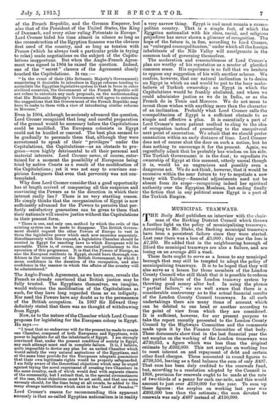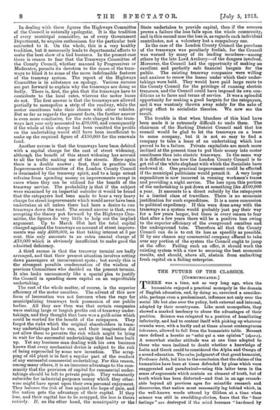MUNICIPAL TRAMWAYS.
MHE Daily Mail publishes an interview with the chair- I_ man of the Barking District Council which throws a further light on the policy of municipalizing tramways. According to Mr. Blake, the Barking municipal tramways have been a persistent failure since they were started. Last year there was a loss of £5,000; this year the loss is £7,200. He added that in the neighbouring borough of Ilford the municipal tramways are also a failure, and are losing on an average £65 a week.
These facts ought to serve as a lesson to any municipal borough that may still be tempted to adopt the policy of municipalizing tramways. It is to be hoped that they will also serve as a lesson for those members of the London County Council who still think that it is possible to redeem the partial failure of the London tramway system by throwing good money after bad. In using the phrase " partial failure," we are well aware that there is a considerable controversy as to the actual financial results of the London County Council tramways. In all such undertakings there are many items of account which can be debited to one head or another according to the point of view from which they are considered. It is sufficient, however, for our present purpose to take the report recently presented to the London County Council by the Highways Committee and the comments made upon it by the Finance Committee of that body. These documents show that in the last financial year the net surplus on the working of the London tramways was £739,053, a figure which was less than the original estimate by £202,000. This net surplus on working has to meet interest on and repayment of debt and certain other fixed charges. These amounted in round figures to £738,556, leaving as a final balance the sum of only f497. That sum has been duly credited to the renewals fund, but, according to a resolution adopted by the Council in 1908, provision for renewals ought to be made at the rate of two-thirds of a penny for each car-mile, and this would amount to just over £150,000 for the year. To sum up these figures : the surplus on working last year was £202,000 less than the estimate ; the sum devoted to renewals was only £497 instead of £150,000. In dealing with these figures the Highways Committee of the Council is naturally apologetic. It is the tradition of every municipal committee, as of every Government Department, to acquire enthusiasm for the particular task entrusted to it. On the whole, this is a very healthy tradition, but it necessarily leads to departmental efforts to snake the best show of a bad business. In the present case there is reason to fear that the Tramways Committee of the County Council, whether manned by Progressives or Moderates, permits its devotion to the cause of the tram- -ways to blind it to some of the more indefensible features of the tramway system. The report of the Highways Committee is in substance an apology. Various excuses are put forward to explain why the tramways are doing so badly. There is, first, the plea that the tramways have to contribute to the local rates, whereas the motor buses do not. The first answer is that the tramways are allowed partially to monopolize a strip of the roadway, while the motor omnibuses take their chance with other vehicles. But so far as regards the present facts, the further answer is even more conclusive, for the rate charged to the tram- ways last year only amounted to £98,000, and consequently if the whole of this charge had been remitted the profits on the undertaking would still have been insufficient to make up the required figure of £150,000 for the renewals fund.
Another excuse is that the tramways have been debited with a capital charge for the cost of street widening, although the benefit of this street widening has accrued to all the traffic making use of the streets. Here again there is a double answer ; first, that in practice the Improvements Committee of the London County Council is dominated by the tramway spirit, and to a large extent refrains from spending money on improvements except in cases where they can be utilized for the benefit of the tramway service. The probability is that if the subject were examined by an impartial outsider it would be found that the ratepayers had been made to bear a very heavy charge for street improvements which would never have been undertaken at all unless there had been a desire to run tramways down the road. The second answer is that, even accepting the theory put forward by the Highways Com- mittee, the figures do very little to help out the implied argument. Up to March 31st last the total capital charged against the tramways on account of street improve- ments was only £608,000, so that taking interest at 3 per cent. this only amounts to an extra annual charge of £18,000 which is obviously insufficient to make good the admitted deficiency.
A third excuse is that the tramway termini are badly arranged, and that their present situation involves setting down passengers at inconvenient spots ; but surely this is the strongest possible condemnation of the wisdom of previous Committees who decided on the present termini. It also looks uncommonly like a special plea to justify the Council in spending more capital on an unprofitable undertaking.
The root of the whole matter, of course, is the superior efficiency of the motor omnibus. The advent of this new form of locomotion was not foreseen when the rage for municipalizing tramways took possession of our public bodies. All they saw then was that certain companies were making large or largish profits out of tramway under- takings, and they thought that here was a gold-mine which could be worked for the benefit of the ratepayers. They forgot the risks which the original shareholders in tram- way undertakings had to run, and their imagination did not allow them to perceive the risk which might be lying in wait for the successful undertakings that had been built up. Yet any business man dealing with his own business knows that every mechanical device is subject to the risk of being superseded by some new invention. The scrap- ping of old plant is in fact a regular part of the conduct of any successful commercial undertaking. For this reason, among many others, it is an immense advantage to the com- munity that the provision of capital for commercial under.. takings should be left to private people. They voluntarily subscribe for industrial purposes money which they other- wise might have spent upon their own personal enjoyment. They balance the risk of loss against the hope of gain, and the nation gets the advantage of their capital. If they lose, and their capital has to be scrapped, the loss is theirs entirely. If, on the other band, the municipality or the State undertakes to provide capital, then if the concern proves a failure the loss falls upon the whole community, and in this second case the loss is, as regards each individual contributor, not a voluntary but a compulsory one. In the case of the London County Council the purchase of the tramways was peculiarly foolish, for the Council was warned by many of its leading members—among others by the late Lord Avebury—of the dangers involved. Moreover, the Council had the opportunity of making an excellent and perfectly safe financial bargain for the public. The existing tramway companies were willing and anxious to renew the leases under which their under- takings were held. They would have paid large rents to the County Council for the privilege of running electric tramcars, and the Council could have imposed its own con- ditions as to fares and terms of service. It was a splendid opportunity for making a good bargain for the ratepayers, and it was wantonly thrown away solely for the sake of giving effect to socialistic theories. We now see the result.
The trouble is that when blunders of this kind have been made it is extremely difficult to undo them. The chairman of the Barking District Council said that his council would be glad to let the tramways on a lease to some company, but it is not so easy to find a, company to take a lease of an undertaking which has proved to be a failure. Private capitalists are much more inclined at the present time to put their money into motor omnibuses than into electric tramways. In the same way it is difficult to see how the London County Council is to get rid of the white elephant with which the Socialists have endowed it. One practical improvement could be effected if the municipal politicians would permit it. A very large expenditure is now incurred in running workmen's trains and providing a night service. The loss upon this portion of the undertaking is put down at something like £100,000 a year. It amounts to a direct subsidy by the ratepayers to a limited class of travellers. There is no economic justification for such expenditure. It is a mere concession to political expediency. If this were done away with the tramways as a system would probably just pay their way for a few years longer, but there is every reason to fear that after a few years there will be a positive loss owing to the superior efficiency of the overground omnibus and the underground tube. Therefore all that the County Council can do is to cut its loss as speedily as possible. If by any chance any commercial company offered to take over any portion of the system the Council ought to jump at the offer. Failing such an offer, it should work the existing system with a view to securing the best economic results, and should, above all, abstain from embarking fresh capital on a failing enterprise.



















































 Previous page
Previous page